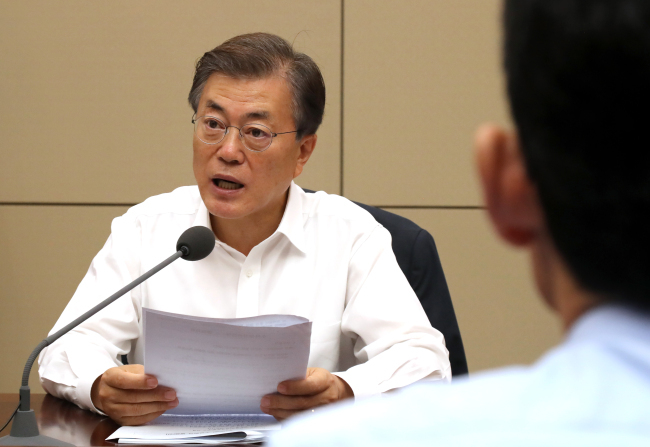President Moon Jae-in made it clear Tuesday that his administration will stick to its signature state health insurance policy despite criticism from political opponents over funding.
The so-called Moon Jae-in Care is meant to expand coverage of the state-run health insurance program, especially for the underprivileged, children and the elderly.
"The government's promise is robust," Moon stressed during a visit to a hospital run by the National Health Insurance Service in Goyang, northwest of Seoul.
The so-called Moon Jae-in Care is meant to expand coverage of the state-run health insurance program, especially for the underprivileged, children and the elderly.
"The government's promise is robust," Moon stressed during a visit to a hospital run by the National Health Insurance Service in Goyang, northwest of Seoul.

The visit commemorated the second anniversary of the implementation of the liberal government's public health care support scheme. Tuesday also marks the 30th anniversary of the launch of South Korea's introduction of a full-scale state health insurance system.
If the government pushes forward with the project as planned by 2022 -- the last year of his tenure -- it will be able to ensure health insurance for each individual in South Korea while minimizing the burden of medical costs, Moon said.
He added that his liberal government will do its best to achieve the goal of raising the state health insurance coverage rate up to 70 percent by that year.
On average, 67.2 percent of patients' medical costs at general hospitals nationwide was publicly financed as of 2018, up from 62.6 percent a year earlier, an official government tally showed.
Reflecting such benefits, the health ministry said in the two years since Moon Jae-in Care went into effect, households saved some 2.2 trillion won (US$1.9 billion) on medical expenses. Of the total, 1.4 trillion won in savings came from state reimbursement for treatment and checkups, with senior citizens and children paying 800 billion won less for medical care.
That ministry added that some 36 million people benefited from changes in the country's healthcare system, with those suffering from life-threatening illnesses, such as cancer, benefiting from expanded state health insurance coverage. (Yonhap)




![[Herald Interview] 'Amid aging population, Korea to invite more young professionals from overseas'](http://res.heraldm.com/phpwas/restmb_idxmake.php?idx=644&simg=/content/image/2024/04/24/20240424050844_0.jpg&u=20240424200058)












![[KH Explains] Korean shipbuilding stocks rally: Real growth or bubble?](http://res.heraldm.com/phpwas/restmb_idxmake.php?idx=652&simg=/content/image/2024/04/25/20240425050656_0.jpg&u=)

